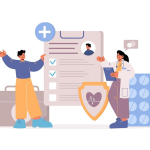
Role of AI in Healthcare: Importance, Benefits, & Challenges
Artificial Intelligence (AI) is revolutionizing various sectors, and healthcare is no exception. The integration of AI in healthcare promises to enhance patient care, streamline operations, and foster medical research.
In this article, we will explore the various roles AI plays in healthcare, including its benefits, importance, and the challenges that come with its implementation.
Introduction to AI in Healthcare
AI in healthcare involves using machine learning algorithms and software to mimic human cognition in analyzing complex medical data. By employing AI, healthcare providers can improve diagnosis accuracy, personalize treatment plans, and enhance patient outcomes. The impact of AI in healthcare is profound and growing.
Importance of AI in Healthcare
Artificial Intelligence is transforming various sectors, and healthcare is one of the most impactful areas. The integration of AI in healthcare is revolutionizing patient care, diagnosis, and treatment processes. Here are some of the key benefits that AI contributes to the healthcare sector:
1. Enhancing Diagnostic Accuracy
AI in healthcare plays a crucial role in improving diagnostic accuracy. Advanced AI algorithms analyze medical images, such as X-rays, MRIs, and CT scans, with remarkable precision.
This assists radiologists in detecting abnormalities early, leading to timely and effective treatments. Moreover, AI systems can process vast amounts of data quickly, reducing the risk of human error.
2. Streamlining Administrative Tasks
Administrative tasks in healthcare can be time-consuming and error-prone. AI in healthcare automates these tasks, from scheduling appointments to managing patient records.
This not only saves time but also ensures that healthcare professionals can focus more on patient care. AI-driven chatbots can handle routine inquiries, freeing up staff for more complex tasks.
3. Personalized Treatment Plans
Personalized medicine is another significant advancement brought by AI in healthcare. AI analyzes patient data, including genetic information, to create customized treatment plans.
This approach increases the likelihood of treatment success and minimizes adverse reactions. AI also monitors patient progress and adjusts treatments as needed, ensuring optimal outcomes.
4. Predictive Analytics for Better Outcomes
AI in healthcare uses predictive analytics to foresee potential health issues before they become critical. By analyzing patient history and current data, AI can predict disease risks and suggest preventive measures.
This proactive approach improves patient outcomes and reduces healthcare costs by avoiding emergency interventions.
5. Enhancing Drug Development
The process of developing new drugs is lengthy and expensive. AI in healthcare accelerates drug discovery by analyzing biological data and identifying potential drug candidates faster.
AI models can simulate how drugs interact with the body, reducing the need for extensive laboratory testing. This speeds up the delivery of new medications to patients.
6. Remote Patient Monitoring
Remote patient monitoring is another area where AI in healthcare makes a significant impact. Wearable devices and AI algorithms track patients’ vital signs and health metrics in real time.
This data is transmitted to healthcare providers, who can intervene promptly if any anomalies are detected. Remote monitoring is especially beneficial for managing chronic conditions and reducing hospital readmissions.
7. Reducing Healthcare Costs
Implementing AI in healthcare leads to cost savings in several ways. Improved diagnostic accuracy and personalized treatments reduce unnecessary tests and procedures. AI-driven administrative efficiency cuts down on operational expenses.
Additionally, predictive analytics help prevent costly emergency treatments by managing health risks early.
Real-world Applications of AI in Healthcare
1. Robotic Surgery
AI-powered robots assist surgeons in performing complex surgeries with high precision. These robots provide real-time data, enhancing surgeons’ capabilities and reducing the risk of complications.
Robotic surgery is a testament to the transformative role of AI in healthcare.
2. Virtual Health Assistants
Virtual health assistants are becoming common in the healthcare industry. These AI-powered tools provide medical advice, remind patients to take medications, and monitor health conditions.
They play a vital role in managing chronic diseases and improving patient compliance.
3. Drug Discovery
AI in healthcare accelerates the drug discovery process. Machine learning algorithms analyze vast datasets to identify potential drug candidates, reducing the time and cost involved in bringing new drugs to market.
This innovation is crucial in addressing urgent health challenges.
Benefits of AI in Healthcare
1. Improved Patient Outcomes
AI’s ability to analyze vast amounts of data leads to more accurate diagnoses and effective treatments. This precision improves patient outcomes, reduces mortality rates, and enhances the overall quality of care.
2. Cost Reduction
AI in healthcare helps reduce operational costs. By automating routine tasks and optimizing resource allocation, healthcare providers can save money and reinvest in patient care and research.
4. Enhanced Efficiency
AI streamlines healthcare operations, improving efficiency. From managing patient records to automating billing processes, AI reduces administrative burdens and allows healthcare professionals to focus on clinical tasks.
5. Better Resource Management
Predictive analytics in AI helps in better resource management. Hospitals can predict patient admission rates, optimize staffing, and manage inventory more effectively, ensuring resources are used efficiently.
Challenges of Implementing AI in Healthcare
1. Data Privacy Concerns
AI in healthcare relies heavily on patient data. Ensuring the privacy and security of this data is paramount. Healthcare providers must adhere to strict regulations and implement robust cybersecurity measures to protect sensitive information.
2. High Implementation Costs
The initial cost of implementing AI in healthcare can be high. Developing and deploying AI systems requires significant investment in technology and training. However, the long-term benefits often outweigh these initial costs.
3. Integration with Existing Systems
Integrating AI with existing healthcare systems can be challenging. Healthcare providers must ensure that AI solutions are compatible with current infrastructure and workflows to realize their full potential.
4. Ethical Considerations
The use of AI in healthcare raises ethical questions. Decisions made by AI systems must be transparent and accountable. Ensuring that AI complements rather than replaces human judgment is crucial in maintaining trust in healthcare services.
The Future of AI in Healthcare
1. Expansion of AI Applications
The future of AI in healthcare looks promising. As technology advances, we can expect an expansion of AI applications, from mental health support to advanced surgical procedures.
The continuous development of AI will further enhance healthcare delivery and patient outcomes.
2. Collaboration Between AI and Healthcare Professionals
AI in health care will increasingly involve collaboration between AI systems and healthcare professionals. AI will provide valuable insights and support, while human expertise will guide decision-making.
This synergy will lead to more effective and efficient healthcare services.
3. Regulatory Developments
As AI becomes more prevalent in healthcare, regulatory frameworks will evolve to address new challenges and opportunities. Ensuring that AI applications comply with ethical standards and legal requirements will be essential in fostering trust and widespread adoption.
Conclusion
AI in healthcare is transforming the industry, offering unprecedented opportunities to improve patient care, reduce costs, and enhance efficiency. Despite challenges, the potential benefits of AI are immense.
As technology advances, the role of Artificial intelligence in healthcare will continue to grow, paving the way for a healthier future.
Frequently Asked Questions (FAQs)
What Is AI In Healthcare?
AI in healthcare refers to using artificial intelligence technologies, such as machine learning and algorithms, to analyze medical data, enhance diagnostic accuracy, personalize treatments, and streamline healthcare operations.
How Does AI Improve Diagnosis In Healthcare?
AI improves diagnosis by analyzing medical images and patient data with high precision, detecting abnormalities, and providing accurate insights that aid healthcare professionals in making informed decisions.
What Are The Benefits Of AI In Personalized Medicine?
AI in personalized medicine tailors treatments based on individual patient data, ensuring more effective therapies and reducing the risk of adverse reactions. This approach enhances patient outcomes and satisfaction.
What Challenges Are Associated With Implementing AI In Healthcare?
Challenges include data privacy concerns, high implementation costs, integration with existing systems, and ethical considerations. Addressing these challenges is crucial for the successful adoption of AI in healthcare.
How Will AI Impact The Future Of Healthcare?
AI will expand its applications in healthcare, foster collaboration between AI systems and healthcare professionals, and drive regulatory developments. This will enhance healthcare delivery, improve patient outcomes, and ensure ethical and legal compliance.
Enhance Patient Care and NABH Compliance with LazyMonkey
LazyMonkey is your all-in-one solution for improving patient care, retaining more patients, and meeting NABH standards. Our powerful QR-based feedback tool enables you to capture real-time insights from patient feedback, discharge surveys, staff and doctor evaluations, and clinical research, while also streamlining inter-departmental communication.
Transform your healthcare facility today - reach out to us at hello@lazymonkey.in, or request a demo here!
Elevate Your Restaurant Experience with LazyMonkey
LazyMonkey’s QR-based feedback system helps you gather real-time insights from customers, track satisfaction levels, and enhance the dining experience. Get instant feedback on your menu, service, and ambience, and make data-driven improvements to boost repeat customers and reviews.
Improve your restaurant today – reach out to us at hello@lazymonkey.in, or request a demo here!
Empower Student Engagement and Campus Improvement with LazyMonkey
LazyMonkey offers a seamless way to gather student feedback, track satisfaction, and enhance campus life. From course evaluations to dorm feedback, our QR-based solution makes it easy to capture valuable insights and improve student retention.
Upgrade your university experience – contact us at hello@lazymonkey.in, or request a demo here!
Streamline Feedback and Drive Performance Across Your Enterprise/Franchise with LazyMonkey
Whether you manage one or multiple locations, LazyMonkey’s QR-based feedback system helps you gather real-time employee and customer feedback. Improve operational efficiency, track satisfaction, and make data-driven decisions to enhance brand consistency and growth.
Transform your franchise today – reach out to us at hello@lazymonkey.in, or request a demo here!
Enhance Customer Satisfaction and Service Standards in Banking with LazyMonkey
LazyMonkey empowers banks to capture real-time feedback from clients across branches. Improve customer experience, assess service quality, and ensure regulatory compliance with our QR-based solution, helping you retain clients and meet banking standards.
Elevate your bank’s customer care – contact us at hello@lazymonkey.in, or request a demo here!
Boost Customer Engagement and Mall Satisfaction with LazyMonkey
LazyMonkey’s QR-based feedback tool enables you to collect feedback from shoppers, track satisfaction, and enhance the mall experience. Gather insights on store services, cleanliness, and entertainment to create an unmatched customer journey.














